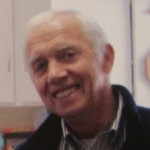(The following article by writer, Tom Cavanagh was first published in The Record, May 31, 2011 – Daniel Coulombe, News Editor.)
TRY TO REMEMBER, AND IF YOU REMEMBER . . .
Memory or the lack of it is on my mind. I visited my brother recently who no longer recognizes me, and yes, Alzheimer’s disease is
devastating. On my way home I picked up a book by Joshua Foer relating to memory. The title, Moonwalking with Einstein: The Art and Science of Remembering Everything explains little but the subtitle is intriguing: “The Art and Science of Remembering Everything.” I have no desire to remember everything but I would dearly love to draw on more.
I am presently working on a book about our family, and years ago my brother and sister and I made occasional sporadic efforts to fill in the blanks in our shared past, but with limited success. My lasting impression of our endeavours is good hearted fun but frustrating confusion. In elementary school did I really steal money from mom so I could treat friends at school? Where exactly was our farm? Near Peterborough, sure, but where? Where in Ireland did we come from? When? Why did we not associate with close cousins on our father’s side? Did the Cavanagh Funeral Parlour ever have funerals? If not how did we survive? Was it mom who conveyed and nourished our deep solid insecurities? Or are we just normal Peterborough types? What were the sources of our father’s struggle with demon rum? Why did we not seek answers amongst ourselves and from parents? Or was isolation from elders simply a typical unexceptional feature of our generation and time?

So many questions, and the funny thing is that thirty plus years ago finding the answers for many of our questions would have been easy. But those with the ready answers are no longer with us. As Dylan sang “they all moved away to that beautiful home by the bright crystal sea.” No matter, because for some questions facile answers are impossible. But we could have a lot if we’d tried harder. Today there is no one around to ask. (There’s a lesson there, dear reader.)
Early on in Foer’s book he submits that about one year of every ten is spent compensating for things forgotten or misplaced. To put it differently the average person spends forty days every year looking for things gone missing – earrings, reading glasses, lost keys, wallets, whatever. I don’t know where or what evidence exists for that claim but it sounds right for me. Perhaps it’s the only example of my life where I’m above average. Certainly former colleagues from my Champlain College years could testify to wasted minutes and hours in searches for innumerable important items. Well, they seemed important at the time: papers, files, documents, letters, gloves, scarves, cigarettes, filters, lighters, books, glasses, keys, etc. Some people were impressed with my dedication and hard work. “He spends so much time at the college.” Very true, – but usually I was just looking for things.
Foer’s book is fascinating. You can improve your memory and he provides several ways to do it. It’s not easy. But he claims, with practice, you can shuffle a whole deck of cards and memorize the order. People who compete in memory tests can do three and more decks at a time. Hard to believe but true. One is tempted to label the” methods” used as ‘tricks.’ But be careful. ‘Skill’ and ‘determination’ are better and more accurate descriptive words.
Foer explains that individuals who win world memory championship usually have average memories. He became the American champion himself and it all began simply with a journalist’s curiosity — his. He wanted to find out more about these unusual and often erratic individuals with such incredible memories.
Well if you have trouble locating the car keys, or if you can’t even remember where the car is, you might find Foer’s book helpful.
Foer’s book was not what I was looking for. Alzheimers was on my mind and it is not in the index, nor mentioned directly. But having won the American championship with less than 2 years preparation Foer was tested at the University of Florida. Was he in any way unique? The answer is a bit evasive but encouraging: ”I’m not sure there’s anything in how you improved that is completely outside the range of what a motivated college student could do.” My reaction: WOW!
It’s a good read and I give the last word to Foer. He does not address Alzheimers directly but there is something pertinent there.
“Remembering more is only the most obvious benefit of the many months spent training my memory. What I had really trained my brain to do . . . , was to be more mindful, and to pay attention to the world around me. Remembering can only happen if you decide to take notice.”
I started with the wrenching heartbreaking Alzheimers illness. Foer is no expert and writes well. Still I wish he’d offered more on the relationship between improving memory and losing it.
______________________
Tom Cavanagh – Bio
Married 51 years and still in love with same woman. (“If my wife finds out, I’m in big trouble.” Henny Youngman) Have 5 children – now handsome successful adults. Taught elementary, high school, college, and university level. Educational career in Canada took me to B.C., Ontario, Quebec. Beyond Canada, I worked and lived in Africa 6 years, (Ghana, Malawi), England 1 year, Sri Lanka, Russia, Ukraine, Armenia, Bolivia, Guyana, Colombia, Jamaica. (Most of these projects entailed volunteer work.) Editor with Guy Lecavalier of “SIMGAMES The Canadian Journal of Simulation and Games.” Retired as Academic Dean in the CEGEP system. A writer all my life, I have written more than 400 articles and one book. Working on a second. Probably should be more interesting than I am, but what can you do.
